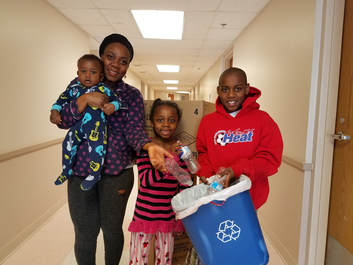 DW resident Jenemah Tamba with her children Isaiah, Ava and Genius participate in the recycling program at DW. DW resident Jenemah Tamba with her children Isaiah, Ava and Genius participate in the recycling program at DW. By Maureen Schriner* At Dakota Woodlands, the Eagan-based shelter for homeless families, the staff and residents have lengthy lists of “need to” and “must do” tasks in order for the families to transition from the shelter to their own new homes. The families are under stress and struggle with many personal issues. But Dakota Woodlands bravely tacked on one more “must do” action item: Recycle more. When Nicole Bathgate, operations director at Dakota Woodlands, saw the opportunity last year for the shelter to receive funding and training through the Business Recycling Incentive Program offered by Dakota County, she applied. Dakota Woodlands was awarded a grant for almost $1,800, which paid for blue recycling baskets, large recycling bins for the kitchen, outdoor stainless steel recycling bins, labels and signage, as well as technical consulting and education sessions. The funds for the incentive program came from Dakota County, with technical assistance provided by sustainability consultants at the Minnesota Chamber of Commerce’s nonprofit subsidiary, Minnesota Waste Wise Foundation. While Dakota Woodlands had tried recycling in the past, Bathgate said the staff and board of directors recognized the value of the incentive program. “Dakota Woodlands is a lot like other local businesses,” Bathgate said. “We have worked to be good neighbors and active members of the community, and our efforts to do more recycling are one more way we can do that.” Renee Burman, Dakota County senior environmental specialist and Business Recycling Incentive Program coordinator, said the county takes seriously efforts to increase recycling so it can meet new sustainability requirements under a Minnesota law passed in 2016. “A new state law requires us to increase our recycling efforts with our businesses and residents,” Burman said. By 2030, for all waste produced in Dakota County, 75 percent of recyclable materials must be recycled, rather than dumped in landfills. “Right now, our recycling rate is 48 percent,” Burman said. “To reach 75 percent, it’s going to take everyone.” Once Dakota Woodlands was approved for the grant, the staff scheduled an onsite visit with Allison Sawyer, a sustainability specialist with Minnesota Waste Wise. “The shelter is a unique nonprofit because it has both commercial waste, from its kitchen and business operations, as well as residential waste,” Sawyer said. One challenge is the high turnover rate of residents. Dakota Woodlands has 22 homeless families at a time, with stays averaging three to six months, although Bathgate notes many families have been staying longer due to lack of available affordable housing. Over a year, that means over 100 families are moving in and out of the shelter. Bathgate said the key has been to make recycling easy and accessible to residents and staff. During site visits, Sawyer walks with the organization’s staff inside and outside the building to peak into garbage and recycling containers. It’s not dumpster diving, Sawyer clarified. The peaking helps to identify opportunities to recycle more. “A lot of businesses we approach will say, ‘We have recycling bins, we’re good.’ It’s going through and getting them to take a look at all the paper or any other recyclables going in the trash, that’s what gets them motivated to change.” Digging through the garbage is exactly what the Minnesota Pollution Control Agency did in 2013, and that research led to increased recycling goals for the Twin Cities area in state law, Burman said. The research report issued by the MPCA found too much trash could have been recycled or composted instead: 31 percent was organics, 25 percent was paper, and 18 percent was plastics. The report proved “we’ve really got to get projects moving forward faster and in a more timely manner,” Burman said. One project Dakota Woodlands has taken on is reducing cardboard boxes in the trash. Large and small boxes come into the shelter weekly from food and supply deliveries. Some boxes are now reused as moving boxes for families leaving the shelter, and others are recycled. The Dakota Woodlands kitchen has seen the most improvement in recycling. Minnesota Waste Wise’s recycling education sessions had to fit into the programming schedule at Dakota Woodlands, which is filled almost daily with programs provided by staff and community experts to train residents on life skills, financial literacy and personal wellness. Bathgate praised Sawyer’s work. “She was fantastic. She helped with the entire recycling program process and even taught recycling classes to our community.” The next stage is to build a culture and habit of recycling at Dakota Woodlands, said Bathgate. “We’ve seen some unexpected positive results.” The shelter’s trash dumpster is less full, while the recycling dumpster is overflowing. If that shift continues, the shelter should eventually save money in garbage service costs. Sawyer said she was able to estimate increased recycling for Dakota Woodlands. “Since adding the new recycling bins, the building has added an estimated 3,432 pounds of recycling for an annual total of 10,000 pounds of recycling.” Sawyer noted saving money can be another benefit for businesses that recycle. Burman added that larger corporations in Dakota County have been enticed to bump up their recycling because of the potential for larger cost savings. The county is encouraged to see small organizations, such as Dakota Woodlands, join in the push for the county to reach its 2030 recycling goal. Find more information on recycling incentives and resource assistance, search “business recycling” at dakotacounty.us. * Maureen has volunteered at Dakota Woodlands as a tutor, piano teacher and communicator. |
AuthorJennifer Harrison Archives
August 2023
Categories
|
